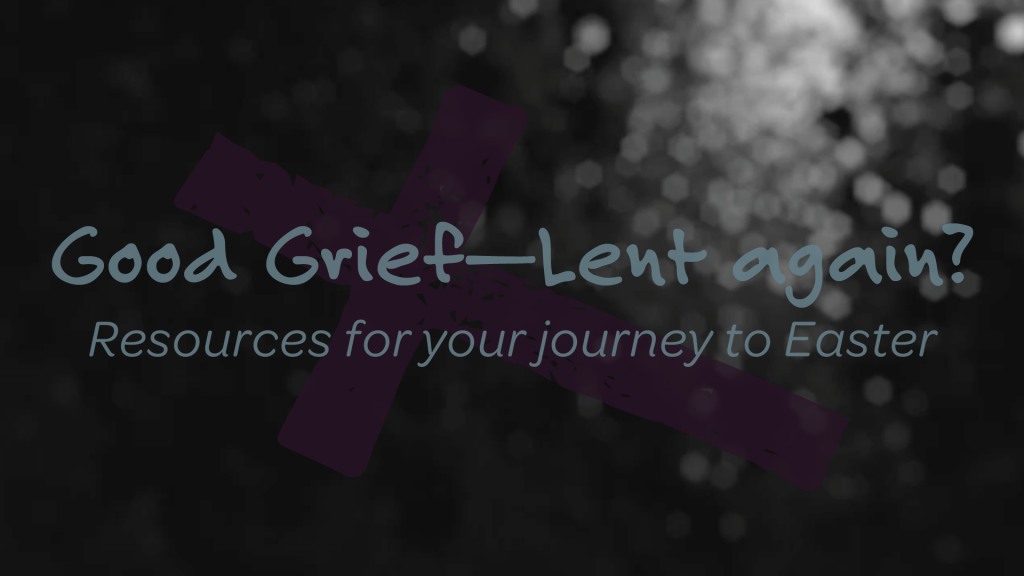Next Wednesday, Christians across the world will begin to observe Lent. Many churches offer the sign of ashes to remind congregants of their vulnerability and common destination. On this day last year, we held a service based on the Psalms of Lament. As the service leader, I can remember explaining why we needed to lament. Little did we know, that was one of the last in-person services we would share together for many months. We had no idea the lamenting that was yet to come. To some extent, it feels like Lent 2020 never ended.
I don’t think I am alone in feeling tired of being tired. And yet, Lent is here again. I find myself thinking: Good grief, do we need more fasting? More lessons in how to lament? This year it is good to remember that while fasting is a traditional practice, it isn’t the ultimate point. In the Christian tradition, fasting and feasting are two sides of the same coin. Grief can indeed be good, when it is healthy. This year, we will again declare the invitation to come, share in the table of one who is gentle and humble in heart.
Come to me all who are weary and heavy laden and I will give you rest. Take my yoke upon you and learn from me for I am gentle and humble in heart. And you will find rest for your soul for my yoke is easy and my burden is light.
In the life of the church, the lenten season is an invitation to participate in a community that acknowledges reality. The reality is that many of us and our neighbors are weary. We experience anxiety, fear, isolation, exploitation and loss. This is not news. Rather than ignoring the painful and unjust parts of life, this season is an invitation to hold them before the God who is “moved by our pains and participates in the fullness of the human struggle.” (Henri Nouwen) Observing this season isn’t a requirement, but rather an invitation to begin a journey toward Easter that includes real, deep consideration of what is wrong. When we arrive, we discover the gifts of healing, freedom, and new life.
One of the unique contributions of Christianity to the world is to recognize that something as complex as suffering demands truly holistic remedies. We don’t have to stop with lament. We can agree with God that we are included as a part of what is wrong with the world. Our Scriptures offer wisdom for repenting and going in a new way—cultivating new hearts, new vision, and hope for a weary world.
The journey begins on Wednesday, February 17th, with a virtual service: When God Weeps. You are invited to make a quiet space at home. Light a candle. Unplug from work and activities. The music and readings will be a gift to you, highlighting three moments in Jesus’ life when he was moved to tears. We will hear the invitation from the man of sorrows, familiar with grief, to find rest.
From February 17th through April 2nd, a prayer station will be open to the community daily by reservation to ensure social distancing. You can sign up here to visit the sanctuary. There are stations designed to guide you in naming your losses, experiencing God’s comfort, and nailing your prayers to the large wooden cross, where they will accumulate until Easter.
One significant challenge of this last year has been the limitations on hosting funerals and other means for celebrating the lives of those who pass away. If you or someone you know has lost a loved one during this last year—to COVID-19 or any other cause—you are invited to bring their name and a photo, if desired, to add to a memorial that will stand in the church until we reopen later this year. While we cannot safely be together as a whole congregation, these stations are something we can do together to envision the gospel in our midst.
While visiting the church, you can also pick-up free materials and assembly instructions for your own at-home prayer station. Sign up here to participate. The kit will include everything you need to bring the outdoors into your home, making a wilderness centerpiece to remind you to pause each day for meditation on verses provided in your kit. If you follow these throughout the six weeks of lent, they will take you on a journey of naming our losses and griefs, bringing them to Jesus, and participating in individual and corporate repentance.
The journey concludes April 2nd with a virtual service on Good Friday. This is a service built around Jesus’ 7 last words and death. Stay tuned for more updates on Good Friday and Easter Sunday services.
Written by Sarah Bartley

